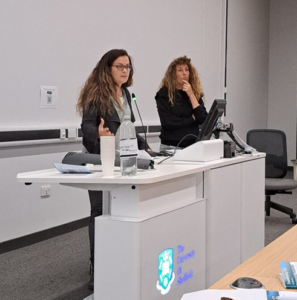The research team presented preliminary findings from our research project “Transnational Families in Europe: Care, Inequalities and Wellbeing” at the 6th Transforming Care Conference held in Sheffield (UK) in June 2023. The project team participated in two sessions of this conference focused on the theme of “Boundaries, Transitions and Crisis Contexts”: 1) a thematic panel titled “The Care-Migration system nexus: De-centring ‘Global North’ perspectives”; and 2) a symposium on transnational families’ care needs and practices during the COVID-19 pandemic.
Thematic panel: “The Care-Migration system nexus: De-centring ‘Global North’ perspectives”
In “The Care-Migration system nexus: De-centring ‘Global North’ perspectives” thematic panel, the project team contributed two papers drawing from the emerging research findings in France and Spain, and Sweden and the UK.
Polina Palash (Aix-Marseille University) and Andrea Souto García (University of A Coruña) presented a paper entitled “Care, wellbeing and inequalities in transnational families: a comparative perspective from France and Spain” co-authored with Virginie Baby-Collin (Aix-Marseille University) and Laura Oso (University of A Coruña). Drawing from rich and in-depth multi-sited ethnographic work with families spread across France, Spain and Colombia, the paper explored the role of care in the genesis, maintenance and dissolution of transnational familyhood.
Rosa Mas Giralt (University of Leeds) and Katarina Mozetič (Malmö University) presented a paper co-authored with Ruth Evans (University of Reading) and Brigitte Suter (Malmö University) focusing on young people as caregivers in Sweden and the UK. The paper foregrounded the salient caregiving roles that children and young people can play in the resource environment of transnational families; roles that have often been neglected in transnational families’ research.
The panel organisers, Majella Kilkey and Loretta Baldassar, had invited contributions that helped to interrogate dominant conceptualisations in transnational families’ scholarship which tend to be shaped by global North perspectives.
The questions and discussion which followed the presentations highlighted how the Sweden and UK paper had challenged views on caregiving in childhood and young adulthood as a ‘burden’ and purely detrimental for young carers. Instead, it highlighted its positive aspects as part of daily life and family solidarity common in many countries of the majority world. The Spain and France contribution helped to emphasise the points of view of transnational family members in countries of origin and the reciprocal nature of caregiving, challenging narratives which prioritise unidirectional understandings of sending societies as receivers of financial and other care.
A symposium on transnational families’ care needs and practices during the COVID-19 pandemic
The Symposium session organised by the project team aimed at considering emerging findings on how the COVID-19 crisis and related emergency measures implemented to combat the pandemic has impacted both proximate and distant’ care practices and arrangements between younger, middle and older generations of transnational families in France, Spain, Sweden and the UK.

The session had an engaged audience and benefited from the insightful critical discussion provided by Erika Kispeter (London School of Hygiene and Tropical Medicine).
The contributions and Q&A that followed highlighted the ways in which, in all project countries, recent migrants and those with precarious legal statuses, were more likely to be excluded (purposedly or due to linguistic and digital barriers, or type of jobs/work arrangements) from the policy measures implemented to cushion the loss of income and employment, and to face barriers in accessing health and other services.
Together with the travel restrictions which disrupted care mobilities, these exclusionary dynamics posed significant challenges for transnational family members to continue providing care locally or cross-borders, and to secure or maintain the legal status of different family members. They also had detrimental impacts on the emotional and psychological wellbeing of different generations.

